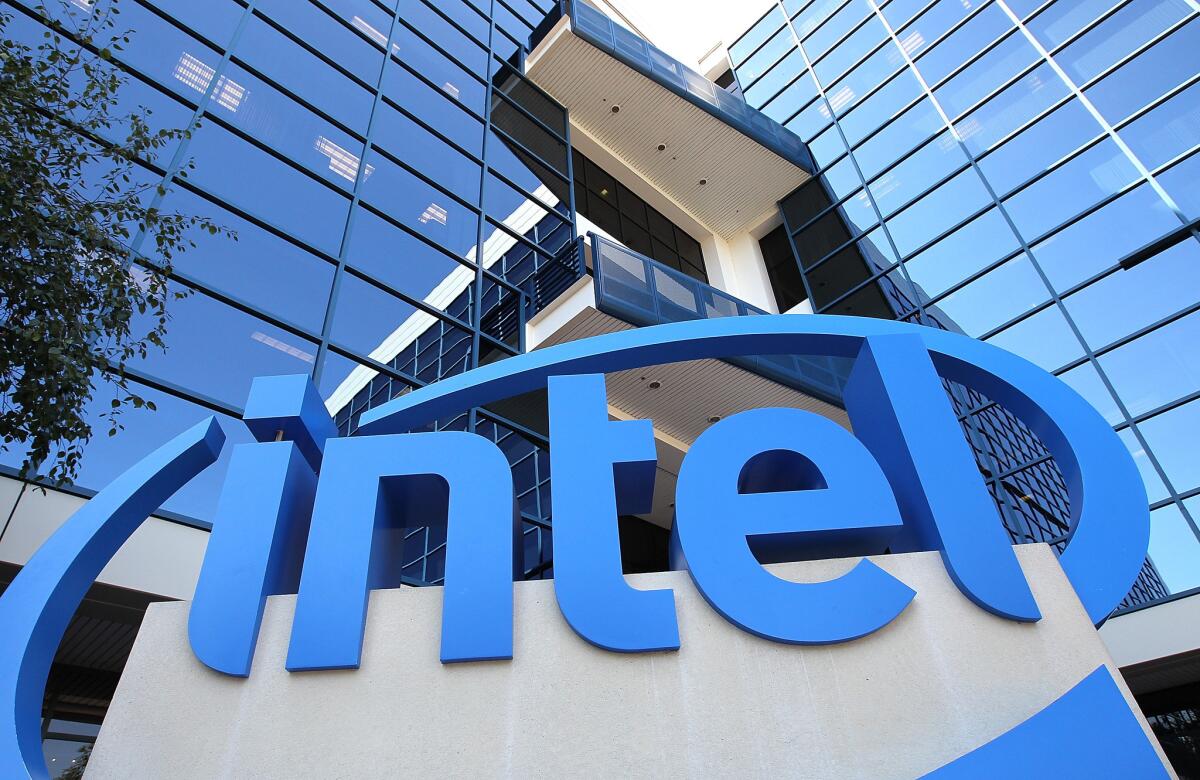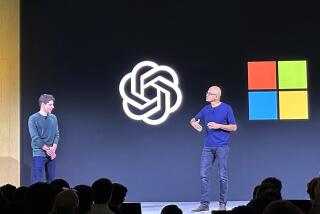Intel buying Altera for $16.7 billion in latest chip deal

A sign with Intel’s logo stands at company headquarters in Santa Clara, Calif., on July 20, 2011.
Intel Corp., the Santa Clara microprocessor giant and pillar of Silicon Valley, joined the merger wave sweeping through the industry by agreeing to purchase smaller chip maker Altera Corp. for $16.7 billion in cash.
It’s the second big deal in a week in a chip industry that is consolidating to adapt to slowing growth. On Thursday, Avago Technologies Ltd. agreed to buy Broadcom Corp. in Irvine for $37 billion in the largest merger on record in the tech industry.
The Intel-Altera marriage announced Monday has been expected. There were reports this spring that Intel was negotiating to acquire Altera as a way to diversify its product line and expand sales.
Intel agreed to pay $54 a share for the San Jose company — the same price that Altera reportedly rejected about a month ago. The deal is subject to approval by Altera’s stockholders.
With sales of nearly $56 billion last year, Intel is the leading producer of microprocessors used in personal computers and large-scale data-center computer servers, making its chips the backbone of worldwide email and Web pages.
Altera specializes in designing so-called programmable semiconductors that can be tailored for specific uses by its customers, primarily those in the telecommunications, wireless, automotive and networking industries.
Altera, with sales last year of $1.9 billion, is among the chip designers that rely on outside manufacturers to produce most of its semiconductors. Those manufacturers include Intel under a partnership formed in 2013.
Having Altera in-house means “we can make the next generation of semiconductors not just better but truly able to do more,” Intel Chief Executive Brian Krzanich told analysts on a conference call Monday.
The proposed deal also should help Intel tap into a growing segment of the data-center market, said Christopher Rolland, an analyst with FBR Capital Markets & Co.
In that segment, some large Internet players such as Google Inc. and Facebook Inc. are adding programmable chips from the likes of Altera to the main central-processing chips made by Intel to boost overall performance, in effect turbocharging their servers, he said.
“Now Intel will be able to give their customers a chip that will combine the [basic] server chips and these programmable chips into a single product,” Rolland said.
Krzanich told the analysts as much, saying “Intel continues to drive Moore’s Law,” which is named after Intel co-founder Gordon Moore and holds that the power of the tiny, dense integrated circuits doubles about every two years.
“This acquisition is a perfect extension of this strategy,” Krzanich said.
Media reports surfaced two months ago that Intel was negotiating with Altera, and a month ago, Altera reportedly balked at a $54-a-share buyout offer. That was a 46% premium from Altera’s stock price of about $37 at the start of the year.
Altera’s rejection angered some of its institutional investors, including Parnassus Investments, a San Francisco firm that owns 2.7 million Altera shares, less than 1%, as part of its $16-billion portfolio.
Now that Altera has accepted Intel’s bid, “I’m glad they changed their mind,” Parnassus President Jerome Dodson said. “It’s a reasonable price. They’re getting full value for the company.”
Altera’s stock jumped $2.83, or nearly 6%, to close at $51.68 a share Monday.
Intel, a component of the Dow Jones industrial average, fell 56 cents to $33.90 a share.
The Avago-Broadcom deal would create the third-largest U.S. chip maker behind Intel and Qualcomm Inc.
Now the market is wondering if San Diego-based Qualcomm, a leading maker of chips for smartphones, might also be shopping.
“Undoubtedly, they are going to be looking; you don’t want to be the last guy to make an acquisition,” said Cody Acree, managing director at Ascendiant Capital Markets in Irvine.
There was speculation that Qualcomm might consider a rival bid for Broadcom, though Qualcomm declined comment about that last week.
Qualcomm has “a big cash balance and, from what we can tell, an appetite to
do a deal,” said analyst Romit Shah of Nomura Securities.
“They can grow organically, but it just doesn’t seem like there’s strong growth,” Shah said. “Shareholders want to see immediate value, which means making decisions that enhance the value of stock soon.”
Indeed, activist hedge fund Jana Partners has pushed for Qualcomm to split its licensing and chip businesses, among other proposed actions, to boost investor returns.
james.peltz
@latimes.com
Times staff writer Paresh Dave contributed to this report.







